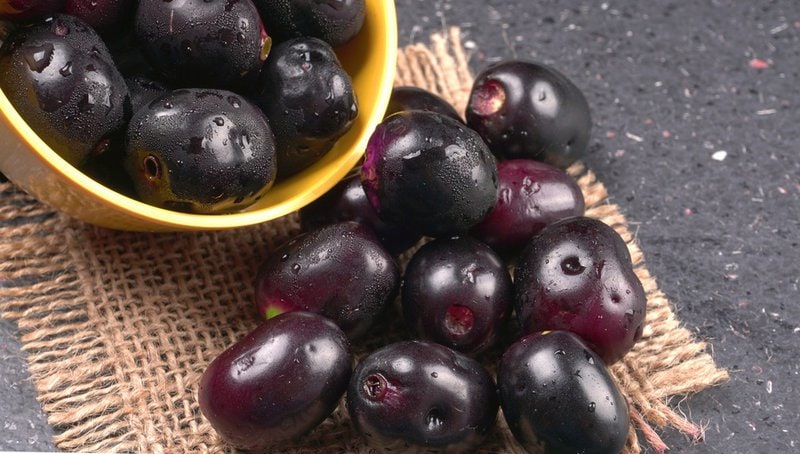Plums are delightful to the eyes and taste buds of humans and dogs. Plums grow on trees and are similar in size and appearance to apples, though their purple tint distinguishes them. There are six different species of plum with varying flavors to tantalize the taste buds. In addition, plums contain various nutrients that can enhance doggies’ health. So, can dogs eat plums?
To answer the burning question, dogs cannot eat plums. This is because its flesh contains toxins such as cyanogen, amygdalin, hydrogen cyanide, and prunasin, which can harm your canine. Although plums contain beneficial ingredients, including antioxidants, fiber, and vitamins, dogs should not eat plums, especially in large amounts.
Without a doubt, your dog will love the taste of plums. They are great snacks that your pooch may wish to eat as much as possible when given the opportunity. While a small piece of the fruit’s flesh may be safe on occasion, we’ll review the many dangers of feeding plums to dogs. But before that, let’s review some benefits of plums and safer sources of these nutrients for your pup.
What Do Plums Do To Dogs?
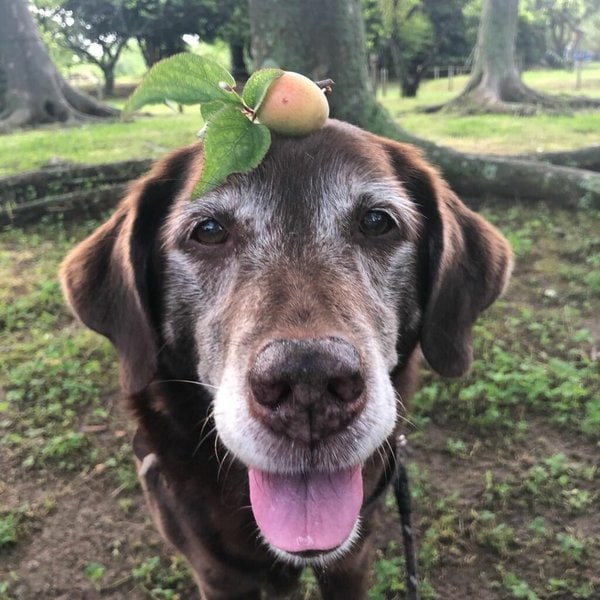
Plums can benefit dogs but also hurt them. It all depends on the quantity of plum you give your pooch and the health conditions of your canine.
Health Benefits For Dogs
Dogs can enjoy various health benefits from eating plums. The advantages arrive via the following nutrients in plums:
- Antioxidants
- Fiber
- Vitamins
- Water content
Antioxidants
Many dog lovers want to give plums to their pooches because of their antioxidants. Antioxidants boost dogs’ immune systems, reduce brain aging risk, help neutralize harmful radicals’ impact, and increase energy levels.
However, antioxidants are also found in other fruits like apples, and vegetables like broccoli, all of which are equally healthy for your dear Fido.
Vitamins
Plums are full of vitamins, especially vitamins A and C. Vitamin A boosts your pup’s vision and makes their coat shiny and radiant.
Meanwhile, vitamin C boosts canines’ immune systems. So, giving plums to your dog in small amounts can help to reduce the likelihood of visiting the vet.
Fiber
Fiber is excellent at helping dogs avoid constipation and other digestion problems. Plums are rich sources of fiber, so giving doggies small amounts as an occasional treat boosts their fiber intake.
Water Content
Water is a naturally occurring substance and a universal solvent that quenches thirst and reduces toxicity in the body. Water is present in some fruits, such as plums. The water in plums can refresh canines, especially when you serve them chilled.
How Many Plums Can A Dog Eat?
Dogs cannot digest excessive quantities of plum, so ensure that your dog only has this fruit as an occasional treat.
The best way to feed plums to your dog is by cutting them into small pieces. This approach makes it easy to monitor your canine pal’s reaction to small quantities of plum. It also helps reduce the risk of choking.
Plums are refreshing and help stabilize dogs’ blood sugar levels. Still, plums can be disastrous for your pooch to overeat. Consult a vet before introducing new food to your dog’s diet, and ask about the best serving size for your dog’s breed and size.
Can Plums Be Poisonous?
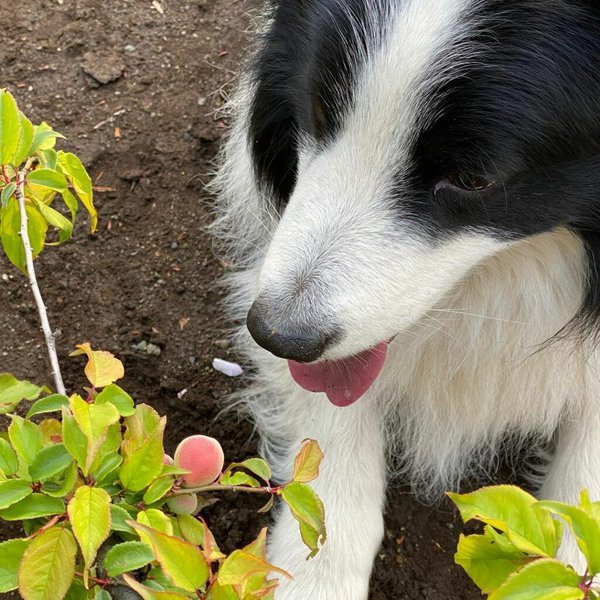
One danger of giving too many plums to your dog is cyanide poisoning. Plums contain a trace amount of hydrogen cyanide, especially in the roots and leaves.
This chemical can lead to stomach upset and other health issues. So your pooch should only eat small quantities of plums once in a while.
Plums also contain stones at their cores, creating a choking hazard for our furry friends.
Are Plums Harmful To Dogs?
Plums have stones, which contain hydrogen cyanide, a poisonous substance. These stones can also choke your pooch. When this happens, your dog will struggle to breathe, which can lead to complications unless you act fast. So it is best that your canine only eat the plum’s flesh.
Additionally, some plums have pesticides on their flesh, which are used to preserve produce. So, always wash fruit before feeding your dog to avoid this danger. Pesticides can cause stomach upsets and other unpleasant experiences for your canine.
Apart from pesticides, unwashed plums may have dirt and grime on their bodies that can cause infections. Dogs should only eat ripe plums since unripe or moldy plums can also cause dogs harm. You do not want to see your dog hurt because you forget a small step like washing.
However, it may be best to avoid feeding dogs plums. Other healthy alternatives are apples, raspberries, bananas, mangoes, pears, pineapples, and apricots.
How Much Plum Is Toxic For Dogs?
It can be challenging to determine the exact quantity of plum that is toxic for dogs. However, allowing your pooch one small bite of a plum’s flesh is safe. Your canine will only enjoy the health benefit of this fruit with this approach.
However, any other parts of this fruit, such as its stem, root, and flower, contain cyanide and are harmful to dogs.
But how can you ensure your pooch only eats the plum’s flesh? The margin for error is small. Even a small amount of the toxic parts of plums may harm your dog. It can lead to breathing difficulties, stomach problems, vomiting, and tremors.
Your dog may bite the stones on the leaves of these fruits. Consequently, you may be forced to pay avoidable hospital bills to save your four-legged furry friend. Therefore, to avoid health issues, do not feed plums to doggies.
Do Plums Have Xylitol?
Aside from the many risks previously mentioned, plums also contain xylitol, a harmful chemical extracted from corn and used as a food additive. Xylitol is a natural sugar alcohol in plums, berries, lettuce, mushrooms, and oats.
This natural sweetener is safe for people but unhealthy for dogs due to the latter’s inferior digestive systems. Small quantities of xylitol can cause hypoglycemia, resulting in vomiting and weakness. It can also lead to seizures, tremors, and coma. If you notice these signs, visit your vet as soon as possible.
What Happens If My Dog Eats Plums?
Dogs’ reactions to eating plums depend on the part of the fruit the dog eats. Stones, leaves, and roots can be dangerous.
Can Dogs Get Diarrhea From Plums?
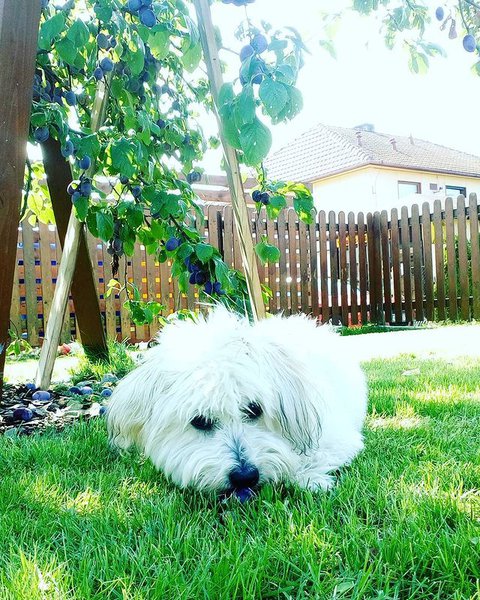
Diarrhea is a digestive problem that can happen when dogs consume foods high in sugar, especially in large quantities. Due to plums’ high sugar, the chances are high that your canine may have diarrhea after eating a large number of plums. This is one reason to avoid overfeeding plums to your four-legged furry friend.
Dogs cannot eat all foods humans enjoy. The quantity of plum that is safe for you may hurt a canine. So, though you may enjoy plums, this does not mean you can feed them to dogs. The potential risks outweigh the benefits, so to avoid your canine becoming ill, avoid feeding them plums.
However, dogs do not get diarrhea from eating small quantities of plums. But exposing dogs to plums may tempt them to eat this fruit in your absence, which can be dangerous.
Your dog may eat an excessive quantity in your absence, causing diarrhea. You may not be available to monitor everything your pooch eats. So, it is best to avoid giving your canine plums.
Can Dogs Eat Plums Without The Pit?
Some fruits have pits, a stony part of the fruit with the plant’s seed. Plums have pits. The pit is sometimes called a “stone” owing to its hard nature. When dogs eat plum flesh, what remains is the pit.
Due to the delicious taste of plums, your dog is more likely to try to eat the pit, which can cause choking or other health complications.
However, suppose your furry friend manages to swallow a plum pit. In that case, it may still cause an intestinal blockage, lodging in the intestinal tract. Hence, always remove the pits before feeding a plum to a dog.
In addition, the plum’s pit contains cyanide, which can be problematic if your dog eats it. Eating a plum pit can result in cyanide poisoning in your canine pal.
Since it is so difficult to avoid the dangers of plums, we recommend avoiding feeding plums to doggies. Instead, choose fruits with similar benefits and fewer risks: apples, raspberries, bananas, mangoes, pears, pineapples, and apricots.
Are Black Plums OK For Dogs?
Black plums are one popular plum variety. Others include damson plums, elephant heart plums, Moyer plums, or greengage plums (European plum).
Can Dogs Eat Plums And Peaches?
Plums and peaches have nutritional value and health benefits for dogs. Plums offer vitamins, antioxidants, and fiber, which enhance dogs’ health. Meanwhile, peaches contain vitamin A and fiber. So, feeding small pieces of these fruits in moderation can benefit canines. However, too many too often can hurt your pooch.
Your dog’s daily meal already contains most of the nutrients in these fruits. Therefore, you don’t need to include them in your canine’s daily diet.
Besides, peaches and plums contain a toxin called “amygdalin.” This chemical is a form of cyanide, which is poisonous to dogs. Amygdalin slows down the oxygen transport in the blood, which can be fatal.
It achieves this damaging impact by reducing the effectiveness of enzymes in the bloodstream responsible for blood transportation.
So, feeding both peaches and plums to your dog may not be the best option. Instead, the safest approach is to choose other safe fruits that do not contain these toxic substances.
Can Dogs Eat Plums Or Prunes?
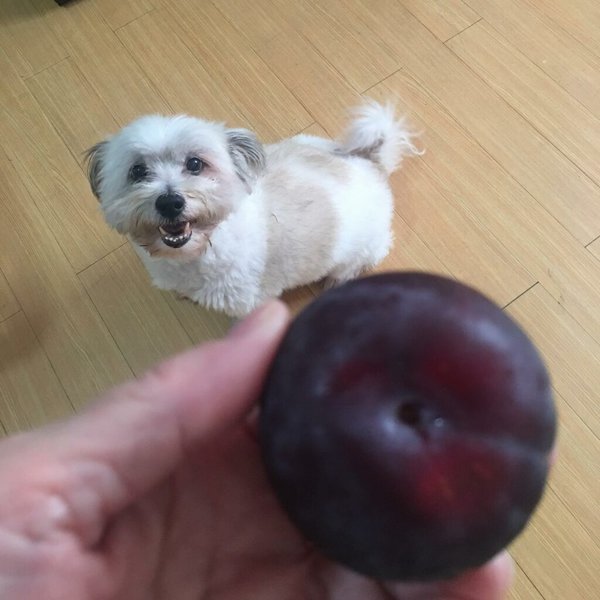
Prunes are dried plums. If you give a slice of prune to your dog, it will not cause any damage unless your pooch is allergic.
Their sugar levels are considerably higher than plums because dried foods contain more sugar. The sugar can rattle your dog’s digestive system, leading to stomach upset.
The reason for this is simple. Before drying, plumes contain a reasonable amount of water, diluting the sugar content. So, eating fresh plums in moderation is safer than eating prunes. The water content in prunes is lower, spiking the sugar content.
Thus, prunes are more likely to cause stomach upset than fresh plums do. Suppose your dog reacts well to a certain amount of plums. This may not be the case if you feed your pup the same amount of prunes because of their higher sugar levels.
Some of the health risks of giving prunes to your canine include:
- Obesity
- Digestive issues
- Bloating
Experts recommend pumpkins as an alternative, especially for dogs with poor bowel movements. Pumpkin helps restore pooches’ digestive systems. Yet, it is best to only feed pumpkin to doggies in moderation.

